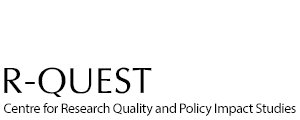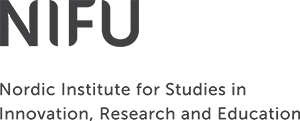Understanding quality
How are notions of research quality negotiated, established and transmitted? Using the understanding of the research system as sets of relationships between policy and funding research
spaces and transnational research fields (Nedeva 2013), we find three distinct arrangements for negotiating and establishing accepted notions of research quality: within (1) disciplinary and (2)
interdisciplinary research fields, and within (3) national (regional) research spaces. Building on the rich set of data sources outlined above, R-Quest will study the notion of quality within these
different settings, including national and European policy arenas/funding agencies, as well as
interdisciplinary, applied and disciplinary research communities.
A major challenge is to study the dynamics between these arenas. Since the mid-1980ies,
negotiating and establishing notions of research quality has shifted from being the domain of
specialised knowledge communities, to become a complex process involving negotiating the
interests of the research policy environments and funding agencies (policy dominated research
spaces) on the one hand, and the knowledge communities/research organisations (science oriented research fields) on the other. This implies that e.g. considerations for ‘accountability’ and
‘usefulness’ are permeating the process of establishing and maintaining notions of research quality,
whereas disciplinary research communities may perceive that academic autonomy is under threat.
Hence, in order to understand the notion of research quality we need to study both the ‘domains’
and the interactions between them. In doing this we plan three entries:
a) How funding agencies operationalise quality: Funding agencies are major arenas for
negotiating research quality notions. R-Quest will study how funding agencies define and
operationalise research quality. Here we are concerned with the extent to which
representatives of the research communities and the funding authorities negotiate and
establish shared and coherent notions of quality, as appearing in strategy documents and
review criteria. Furthermore, we will study how review criteria and guidelines are perceived
and operationalised throughout the review process. This will be based on case studies of
funding agencies, combining document studies, interviews/surveys to reviewers/panel
members, and also matched with researcher survey data.
b) Researchers’ notion of quality: In studying research quality, one intake will be case studies
of highly cited researchers, that is, a group of researchers who are presumed to perform at a
high level. We will address general issues such as their quality notions and practices, and
specific issues such as to what extent they adapt to performance indicators or the need to
account for societal impact when applying for grants. The intake to studying quality notions
may include to what extent the researchers perceive their citation classics as their most
important work, and what they look at when selecting/hiring researchers to their team (e.g.
personal characteristics, metrics/h-index, specific competences, the formal review criteria).
This will be based on case studies of highly cited researchers (and control groups), including
interviews/surveys and CV and citation data. The research will contribute to the
understanding of quality notions across fields of research, as well the interpretation of
citation indicators.
c) PhD students’ learning: Furthermore, we will study how the PhDs learn what is good
science. The plan is to do case studies based on the same samples, i.e. the PhD students of
the highly cited researchers, as well as control groups. Here we are concerned with different
quality cultures/notions and learning practises, e.g. implicit by having their work reviewed
and reviewing others’, adopting to the standards of journals or funding agencies, explicit by
learning standards for laboratory work, research methods, academic writing, etc. The basis
will be both surveys and in-depth interviews.
Across all three topics, the focus will be on shared notions and differences between fields. As
mentioned, there will be extensive use of joint data sources and data collection across the R-Quest
research strands. This implies that cases, institutions, fields and countries to be studied will be
selected to comply also with the concerns of the other strands

